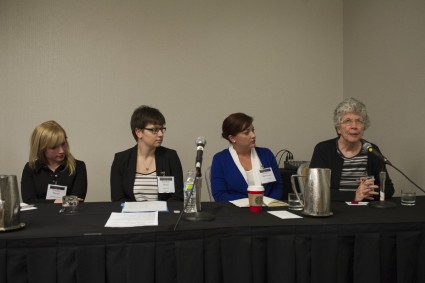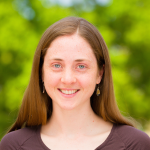The GECC Open Forum on Career Diversity
Structural Change, Practical Suggestions, and Playful History
At an Open Forum hosted by the AHA’s Graduate and Early Career Committee (GECC), this was Karen Wilson’s message for graduate students concerned about their job prospects: We don’t have any control over jobs or job markets. But we do have control over our preparation for whatever job market we choose, so take charge of your own professional development and your career.

Panelists at the AHA GECC open forum. GECC invited graduate students and early career professionals to discuss the AHA’s Career Diversity for Historians initiative and related issues at the 2016 AHA annual meeting.
The GECC Open Forum was a chance for attendees to hear updates and offer feedback on the AHA’s Career Diversity efforts. Representatives from the four AHA Career Diversity pilot programs described their initiatives followed by a lively question and answer session, with almost all questions coming from the graduate students in attendance.
The panelists were Karen Wilson, graduate career officer at the University of California, Los Angeles; Jennifer McPherson, project coordinator at the University of New Mexico; Caroline Marris, graduate student co-coordinator at Columbia University; and Lindsay Martin, Mellon Career Development Officer at the University of Chicago. Audience members seemed intrigued by the initiatives panelists described, which ranged from conferences and internships to less conventional ideas that any history department could adopt. One of my favorites, for example, was UCLA’s “History Hikes,” which offer graduate students a chance for low-stakes networking with alums and other history PhDs in the great outdoors. As a recently minted PhD, I also liked UNM’s strategy of offering instructors a list of twists on assignments that push students to build skills such as quantitative literacy or communication with nonacademic audiences. (McPherson told the audience that they call this approach “Mellonizing the seminar,” in reference to the Mellon-funded AHA program.)
Despite the diversity of the four pilot programs, all are dealing to some extent with the slow pace of cultural change, which the panelists recognized as crucial to the programs’ long-term success. Panelists and audience members observed that graduate students often point the finger at faculty as sticks in the mud (fearing negative reactions if they pursue projects beyond their dissertation). Some noted that cultural change needed to happen amongst graduate students themselves who should develop more confidence in their ability to control their career. Discussion also focused on deeper structural issues, and many audience members commented on their desire for institutional change at the department, university, or national level. One commenter suggested overhauling the structure of PhD programs, while another recommended forming alliances with graduate school administrators since they have experience working with students from many disciplines who pursue a range of careers.
But structural and cultural changes are often slow. In the meantime, it’s clear that some graduate students thirst for practical tips and things they can do to prepare for their career with or without institutional support. For the curious, I will sum up a few of the panelists’ responses:
- Do whatever you can to get skills now: find a job as a research coordinator, organize a conference, start a podcast.
- Look at ads for the kind of job you’d like to have, including the skills and requirements they ask for, and figure out what’s missing in your resume.
- Dive into informational interviews. Always remember to ask before you leave: is there anyone else I should be talking to?
- Explore the many resources on the AHA website, including the Career Contacts program.
Lindsay Martin left both students and faculty with another key message: exploring new skills or areas of history can be fun. That message resonated with Drew University graduate student Jordan Reed (@jordanreed14), who tweeted that “history does not have to be grim to be great.”
Discussions about career diversity can be transformative for PhD students, particularly if these conversations aren’t happening at their institutions. The GECC Open Forum did not disappoint in this regard. As graduate student Tiffany Baugh-Helton (@TbaughHelton) tweeted mid-session, “#aha16 GEC open forum on career diversity is changing my life. #noplanB.”

Anna L. Krome-Lukens is a lecturer in the department of history, as well as lecturer and director of experiential education in the Department of Public Policy at the University of North Carolina at Chapel Hill. She is also project director for the AHA Career Diversity Grant recently awarded to the UNC history department.
This post first appeared on AHA Today.
Tags: AHA Today 2016 Annual Meeting Career Diversity for Historians Resources for Early Career Resources for Graduate Students Graduate Education
Comment
Please read our commenting and letters policy before submitting.






